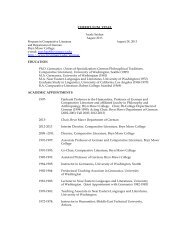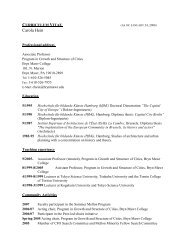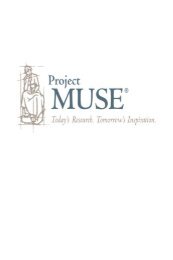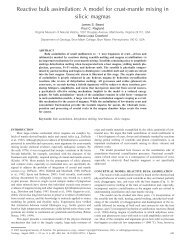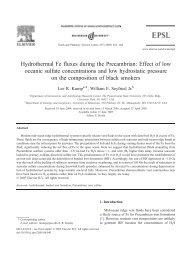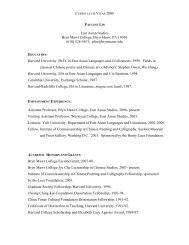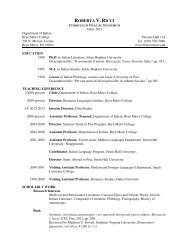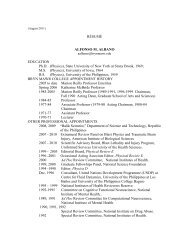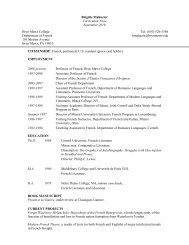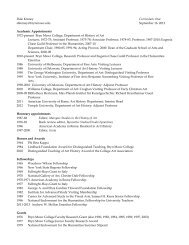Tearing Apart the Zagreus Myth - Bryn Mawr College
Tearing Apart the Zagreus Myth - Bryn Mawr College
Tearing Apart the Zagreus Myth - Bryn Mawr College
You also want an ePaper? Increase the reach of your titles
YUMPU automatically turns print PDFs into web optimized ePapers that Google loves.
EDMONDS: <strong>Tearing</strong> <strong>Apart</strong> <strong>the</strong> <strong>Zagreus</strong> <strong>Myth</strong> 55<br />
regarding <strong>the</strong> Pelinna tablets, <strong>the</strong> lawless ancestors of <strong>the</strong>se passages need not<br />
be <strong>the</strong> Titans. Graf’s hesitation betrays <strong>the</strong> flaw in his own argument: “But <strong>the</strong>se<br />
ancestors are not just ordinary deceased, since Dionysus has power over <strong>the</strong>m:<br />
<strong>the</strong> only ancestors of humans who are closely connected with Dionysus are <strong>the</strong><br />
Titans, who killed <strong>the</strong> god—though it is somewhat unclear what power Dionysus<br />
has over <strong>the</strong>m.” 59 Dionysos actually appears in quite a number of contexts as <strong>the</strong><br />
deity who suspends <strong>the</strong> normal constraints, who bursts <strong>the</strong> bonds that regulate<br />
<strong>the</strong> order of <strong>the</strong> cosmos, providing relief for those constricted or burdened by <strong>the</strong><br />
normal order. 60 His role in freeing <strong>the</strong> initiate, in this life or <strong>the</strong> next, from <strong>the</strong><br />
penalties due for <strong>the</strong> crimes of ancestors is simply an extension of this essential<br />
aspect to eschatology. 61<br />
The idea of a descendant’s paying for an ancestor’s crimes handles two<br />
difficult problems of <strong>the</strong>odicy: why some evil-doers are not visibly punished<br />
by <strong>the</strong> gods and why some apparently innocent folk suffer. In Empedokles and<br />
o<strong>the</strong>rs who accepted a system of metempsychosis, <strong>the</strong> workings of justice are even<br />
neater, in that <strong>the</strong> delayed suffering falls not on some extension of <strong>the</strong> criminal<br />
in <strong>the</strong> form of a descendant, but on <strong>the</strong> individual himself in a later incarnation. In<br />
Empedokles, <strong>the</strong> cycle of reincarnations itself, <strong>the</strong> imprisoning of <strong>the</strong> soul in flesh,<br />
is a penalty for some crime of bloodshed committed as a divine being. For <strong>the</strong><br />
prison of Tartaros or <strong>the</strong> waters of <strong>the</strong> Styx found in Hesiod as <strong>the</strong> punishment for<br />
divine beings who violate <strong>the</strong> order of Zeus, he substitutes <strong>the</strong> prison of <strong>the</strong> body. 62<br />
Centuries later, as we saw above, Plutarch explains Empedokles’ adaptation of<br />
<strong>the</strong> tradition as a case of <strong>the</strong> ancient mythmakers concealing in riddling stories<br />
about <strong>the</strong> Titans <strong>the</strong> doctrine of reincarnation that Empedokles was putting forth<br />
as his own. Plutarch, perhaps following Xenokrates, thus links <strong>the</strong> strands of<br />
(1) sparagmos and (2) punishment, but he does not bring in <strong>the</strong> motif of (3)<br />
anthropogony, a general creation of <strong>the</strong> human race.<br />
hecatombs in all seasons throughout <strong>the</strong> year and perform rites, seeking release from unlawful<br />
ancestors. But you, having power over <strong>the</strong>m, you will release whomever you wish from harsh<br />
suffering and boundless frenzy’ ” (OF 232).<br />
59. Graf 1993:244. Dionysos’ power as Lusios, however, depends not on any special relation to<br />
<strong>the</strong> Titans as <strong>the</strong> criminals (or to <strong>the</strong> humans with a divine tidbit of Dionysos in <strong>the</strong>m), but on his<br />
general function as <strong>the</strong> loosener, a trait illustrated even by <strong>the</strong> effects of wine, <strong>the</strong> most widespread<br />
symbol for <strong>the</strong> god.<br />
60. For <strong>the</strong> role of Dionysos within polis-cult as <strong>the</strong> one who provides <strong>the</strong> necessary temporary<br />
relief from <strong>the</strong> normal order, cf. Sabbatucci 1979:51; cf. also Versnel 1991:139, 166, and Casadio<br />
1987:199ff., on <strong>the</strong> functions of Dionysos Lusios.<br />
61. Cf. <strong>the</strong> Pelinna tablets: “Tell Persephone that Bacchios himself has freed you” (eÊpeØn<br />
Fersefìnai s' íti Bxioj aÎtäj êluse). The tablet from Pherai that proclaims, “<strong>the</strong> initiate<br />
is without penalty” (Špoinoj g€r å mÔsthj), probably contains <strong>the</strong> same idea. The Apulian vase in<br />
Toledo that depicts Dionysos greeting Pluto in <strong>the</strong> underworld seems to symbolize Dionysos’ power<br />
to save his worshippers in <strong>the</strong> realm of <strong>the</strong> dead. (See Johnston and McNiven 1996.)<br />
62. Empedokles B115 DK; cf. Seaford 1986, who traces <strong>the</strong> motifs of <strong>the</strong> imprisonment of a<br />
divine being from Hesiod through Empedokles, Herakleitos, and Aeschylus (although he assumes<br />
that <strong>the</strong> gold tablets provide evidence for <strong>the</strong> Titans imprisoned in human bodies).




